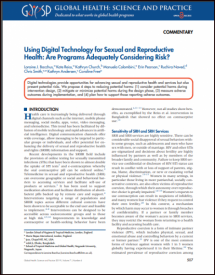Using Digital Technology for Sexual and Reproductive Health: Are Programs Adequately Considering Risk?
This commentary follows the publication of Marie Stopes International’s randomized control trial in Bangladesh which showed that mHealth to promote contraceptive use increased women’s report of gender-based violence.
The commentary describes why use of mobile technology entails risks, and outlines ways in which programs can minimize risks to clients when communicating on sensitive sexual and reproductive health topics. These risks are essential for programs to consider during the Covid epidemic too, since many health organizations are pivoting to digital strategies and remote communication, which may increase risk of inadvertent disclosure SRH service or product use.
Source: Marie Stopes International
Date of Publication: September 3, 2020
SIMILIAR RESOURCES
Tools
Examples
- WHO Consolidated Guideline on Self-care Interventions for Health: Sexual and Reproductive Health and Rights
- Advocacy Roadmap - Igniting a Self-Care Movement for Sexual and Reproductive Health
- Who Self-Cares Wins
- Self-Care: A Cost Effective Solution for Maternal, Newborn & Child Health for All
- Self-Care: Better Daily Health for Individuals and Societies
- Self-Care Quality of Care Framework
- Acceleration of Self-Care in the Time of COVID-19
- Women and Girls Health and Rights Power Model
- Home-Based Care Reference Guide for COVID-19
- Going Online to Accelerate the Impact of HIV Programs
- Self-Care in Sexual and Reproductive Health and Rights: A New Frontier in Healthcare
- Is Contraceptive Self-injection Cost-effective Compared to Contraceptive Injections from Facility-Based health Workers? Evidence from Uganda
- 7 Acts of Self-care You Can Practice during a Winter Lockdown
- Supporting Menstrual Regulation through the Call Centre in Bangladesh
- Costs and Cost-effectiveness of Subcutaneous DMPA through Different Delivery Channels: What the Evidence Tells Us

